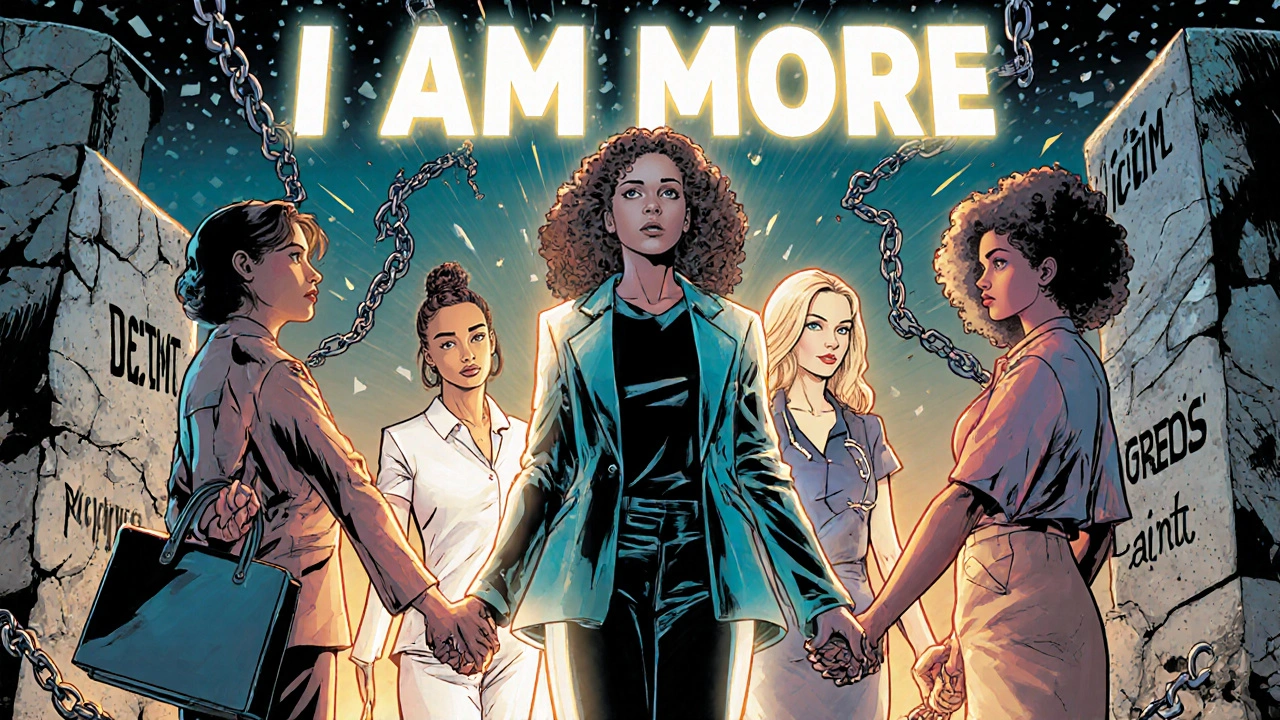Escort Girls Speak Out on Overcoming Stigma: Real Stories from the Front Lines

You’ve seen the headlines. The memes. The judgmental whispers. But have you ever heard what escort girls actually say about the stigma they live with every day? Not the stereotypes. Not the media spin. The raw, unfiltered truth from women who’ve walked this path and come out the other side.
Let’s be clear: stigma doesn’t just hurt feelings. It cuts off access to healthcare. It destroys family ties. It makes reporting violence risky. It turns a job into a life sentence of silence. And yet, more and more escort girls are stepping forward-not to justify their work, but to be seen as human.
What It Really Feels Like to Be Stigmatized
Imagine walking into a doctor’s office and having the nurse flinch when you say what you do for a living. Or getting asked by a relative, "Are you safe?"-like safety is the only thing you care about, not your dignity, your goals, your dreams. That’s the daily reality for many.
Jess, 32, from Manchester, remembers her first panic attack after telling her sister she was leaving corporate HR to work as an independent escort. "She cried. Not because she thought I was in danger-but because she was embarrassed. Like I’d brought shame to the family name. I hadn’t done anything wrong. But suddenly, I was the family secret."
That’s the core of the stigma: it’s not about what you do. It’s about what people think you are. A victim. A deviant. A statistic. Never just a person.
Why This Stigma Exists-and Why It’s Built on Lies
The myth that all sex workers are trafficked, abused, or coerced is everywhere. It’s in movies. In news reports. Even in some activist campaigns that claim to "save" us. But the truth? Most escort girls choose this work. Not because they have no options-but because it gives them options.
Take Priya, 28, from London. She used to work 60-hour weeks in retail, barely covering rent. When she started escorting part-time, her income tripled. She paid off her student loans in 14 months. She’s now studying psychology online. "I didn’t escape poverty by begging for help," she says. "I escaped it by setting my own terms."
Stigma thrives on ignorance. It assumes that if a woman earns money from intimacy, she must be broken. But the data doesn’t support that. A 2023 study from the University of Edinburgh tracked 1,200 independent sex workers across the UK. 78% reported improved mental health after leaving traditional jobs. 82% said they felt more in control of their lives.
How Escort Girls Are Fighting Back
They’re not waiting for permission to speak. They’re using podcasts, Instagram threads, and anonymous blogs to tell their stories. One viral TikTok series, #MyRealJob, features escort girls reading letters from their parents-letters that say things like, "I don’t understand, but I love you anyway."
In London, a group called Unsilenced runs monthly meetups in safe spaces. No judgment. No pity. Just coffee, cake, and real talk. Some come to vent. Others come to mentor new workers. One member, now in her 50s, started escorting in her 20s. She’s been doing it for 30 years. "I’m not a victim," she told the group last month. "I’m a survivor. And I’m proud of what I’ve built."
These aren’t radical activists. They’re mothers, students, artists, nurses on weekends. They’re your neighbor. Your colleague. The woman who smiles at you on the tube.

The Hidden Costs of Silence
When women stay quiet, they’re forced into the shadows. That’s when exploitation thrives. When you can’t talk to your landlord about rent increases because you’re afraid they’ll find out your job, you’re vulnerable. When you can’t report a client who stole your money because you fear the police won’t believe you, you’re trapped.
Legal reform is part of the solution. Decriminalization-like in New Zealand-has been shown to reduce violence against sex workers by 60%. But legal change won’t fix stigma. Only stories can do that.
Every time a woman says, "I’m an escort," and someone doesn’t recoil, the stigma cracks a little. Every time a parent says, "I still love my daughter," it weakens the shame.
What You Can Do-Even If You’re Not a Sex Worker
You don’t have to agree with the work to respect the person. Here’s what actually helps:
- Don’t assume. If someone tells you they’re an escort, don’t ask if they’re "forced" or "sad." Just say, "Thanks for sharing."
- Challenge jokes. When someone says, "All escorts are desperate," call it out. "That’s a stereotype. Real people don’t fit that box."
- Support organizations that give escorts legal aid, housing, or mental health care-like the English Collective of Prostitutes or the UK Network of Sex Work Projects.
- Listen. Really listen. Not to fix, not to judge. Just to understand.
Stigma doesn’t die with laws. It dies with conversations.

Real Stories: Three Women, One Message
Laura, 36, Bristol: "I used to hide my work from my kids. I’d say I was a freelance consultant. When my daughter turned 15, she asked me, ‘Mom, is it true you’re an escort?’ I thought she’d hate me. Instead, she said, ‘That’s cool. You make your own rules.’ I cried for three days."
Maya, 24, Glasgow: "I was kicked out of my flat after my landlord found out. I had nowhere to go. A woman I met at a support group let me stay in her spare room for six months. She didn’t ask questions. She just said, ‘We all need a break sometimes.’ That’s the kind of kindness that saves lives."
Amara, 41, Leeds: "I used to work in a call center. I hated it. I felt invisible. Now, I get to choose who I meet, when, and how. I’ve saved enough to buy my own flat. I’m not asking for sympathy. I’m asking for the same respect you give to any other freelancer."
Final Thought: They’re Not Asking for Permission
Escort girls aren’t begging you to approve of their work. They’re asking you to stop reducing them to a punchline. To stop pretending they don’t exist when it’s convenient. To see them as people who, like you, are trying to survive, thrive, and make sense of a world that doesn’t always make room for them.
Stigma is a cage. And the only way out is to stop locking the door.
Are all escort girls victims of trafficking?
No. While trafficking is a serious issue, it’s not the same as consensual sex work. Most escort girls are independent, set their own boundaries, and choose this work for financial freedom, flexibility, or personal autonomy. Studies show that the vast majority are not coerced. Confusing trafficking with sex work harms both victims and workers by blurring the lines between crime and choice.
Is escorting illegal in the UK?
Selling sexual services is not illegal in the UK, but many related activities are-like soliciting in public, running a brothel, or pimping. This creates a dangerous legal gray area. Independent escorts who work privately, online, and without third parties are not breaking the law, but they’re still targeted by police, landlords, and social services because of stigma, not legality.
Why don’t more escort girls speak out?
Fear. Fear of losing custody of children. Fear of being fired from other jobs. Fear of family rejection. Fear of online harassment. Many have been doxxed, threatened, or had their photos leaked. Speaking out can cost you your home, your relationships, your safety. That’s why those who do speak up are often the ones who’ve already built a support system-or have nothing left to lose.
Can escort girls have normal relationships?
Absolutely. Many escort girls are in long-term relationships, married, or raising children. Some partners know. Some don’t. That doesn’t make their relationships any less real. Relationships are built on trust, communication, and mutual respect-not job titles. The stigma makes it harder, but it doesn’t make it impossible.
What’s the difference between an escort and a prostitute?
The term "prostitute" is outdated and often carries negative, moralistic weight. "Escort" is the term most people in the industry use today. It implies a broader range of services-companionship, dinner dates, travel, emotional support-not just sex. Language matters. Using "escort" respects the person’s choice of identity.
How can I support escort girls if I want to?
Educate yourself. Challenge stigma when you hear it. Donate to organizations like the English Collective of Prostitutes or the UK Network of Sex Work Projects. Advocate for decriminalization. Listen without judgment. The best support isn’t pity-it’s dignity.



Santiago Castiello
November 5, 2025 AT 15:26So let me get this straight-women who choose to sell companionship are ‘empowered,’ but anyone who questions the system is a ‘toxic moralist’? Cool. I’ll stick with my 9-to-5 and let you have your libertarian fantasy.
Also, ‘escort’? Please. It’s just PR for prostitution. Language doesn’t change the transaction.
Triston Hargrave
November 6, 2025 AT 07:59Ugh. Another ‘I’m not a victim, I’m a feminist’ sob story. 😒
Look-I get it, you want to feel like a rebel. But let’s be real: most of these women are running from trauma, not chasing freedom. The data? Biased. The stories? Curated. The system? Still broken.
And no, ‘decriminalization’ won’t fix the fact that society still sees you as a commodity. Wake up.
Jodie Rae Plaut
November 7, 2025 AT 04:26Let’s unpack this properly. The stigma isn’t just social-it’s structural. When housing, healthcare, and employment systems penalize sex workers by default, you’re not just judging-you’re enabling exploitation.
Independent escorts aren’t asking for pity. They’re asking for recognition as autonomous economic agents. The Edinburgh study? Solid. 78% improved mental health? That’s not anecdotal-that’s systemic liberation in action.
Also, calling it ‘prostitution’ is outdated and dehumanizing. ‘Escort’ is the industry-standard term for a reason: it reflects the full scope of services-emotional labor, time, presence-not just sex.
If you’re not supporting decriminalization, you’re not being ‘moral’-you’re being complicit.
Colin Napier
November 7, 2025 AT 19:01Let’s be clear: the UK legal framework is a mess. Selling sex isn’t illegal, but advertising it, sharing premises, or receiving payment from a third party is. That’s not regulation-it’s criminalization by proxy.
And yes, landlords kicking people out over this? That’s discrimination. Plain and simple. Police targeting private workers? That’s moral panic dressed as public safety.
The real issue isn’t the work-it’s the hypocrisy. We’ll tolerate Uber drivers who work 80 hours a week, but a woman who chooses her own hours and clients gets called ‘degenerate’?
It’s not about morality. It’s about control.
Patsy Ferreira
November 8, 2025 AT 01:34Okay but like… why do they even need to tell everyone? I mean, if they’re so ‘empowered’ why not just keep it private? It’s not like they’re curing cancer or anything.
Also, ‘freelancer’? Please. You don’t get a 401k or paid leave. You don’t get health insurance. You’re just… trading intimacy for cash. That’s not a career. That’s a last resort.
And don’t even get me started on the ‘I’m a mom’ thing. Kids deserve better than a parent who’s ‘working as an escort’.
Also, grammar in this post is trash. Should’ve been edited.
William Terry
November 9, 2025 AT 16:31I don't agree with the job but I respect people's right to choose their path. Everyone deserves dignity. If someone can make rent, pay off loans, and raise their kids doing this, who are we to judge?
My aunt worked as a waitress for 20 years and never made enough to buy a house. This woman bought her own flat. That's not wrong.
Also stop calling them victims. They're not. They're people. Simple as that.
Peter Jones
November 10, 2025 AT 03:58There's a compelling case here for decriminalization grounded in public health and human rights. The stigma isn't merely cultural-it's institutional. When social services, law enforcement, and landlords act on assumptions rather than facts, the consequences are lethal.
The Edinburgh data is robust. The personal narratives are consistent. The legal framework in the UK is contradictory and dangerous.
What's missing is a coherent policy response. We need harm reduction, not moralizing. We need housing protections, not evictions. We need legal clarity, not fear.
And yes-language matters. ‘Escort’ isn’t euphemism. It’s precision.
Theophilus Twaambo
November 10, 2025 AT 21:09Wait-so you’re saying that because a woman has ‘agency,’ it’s okay for her to sell sex? That’s not empowerment-that’s commodification.
And who funded that ‘study’? Who wrote the ‘stories’? Are they verified? Are they anonymized? Or are you just swallowing activist propaganda?
Also, ‘I’m proud of what I’ve built’? Built? You built a transactional relationship with strangers. That’s not a legacy. That’s a paycheck.
And why do you keep using ‘escort’? It’s just a rebrand. Same thing. Different packaging. Same exploitation.
Grammar in this post is atrocious. Run a spellcheck.
Douglas McCarroll
November 12, 2025 AT 09:44Let’s zoom out. This isn’t about sex. It’s about autonomy. It’s about who gets to define dignity.
Most of us don’t get to choose our hours, our clients, or our income. These women do. That’s not a flaw-it’s a feature.
And the fact that they’re speaking up despite losing jobs, homes, and families? That’s courage.
Support isn’t about agreeing with the work. It’s about refusing to let fear dictate policy. It’s about saying: ‘You’re not broken. You’re not a statistic. You’re human.’
Decriminalization isn’t radical. It’s rational. And if you’re still stuck on the word ‘prostitute’? You’re not protecting morality-you’re protecting ignorance.